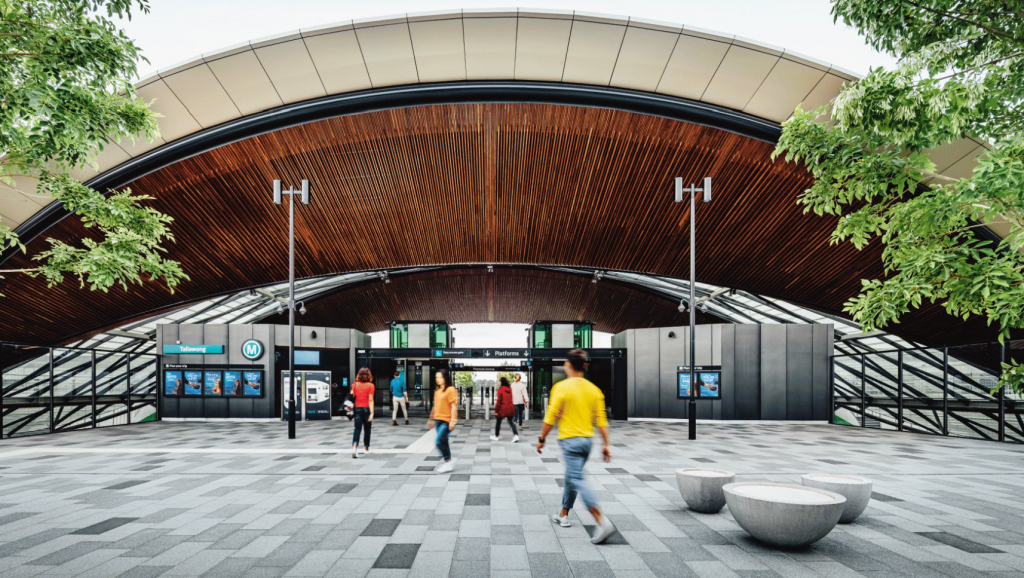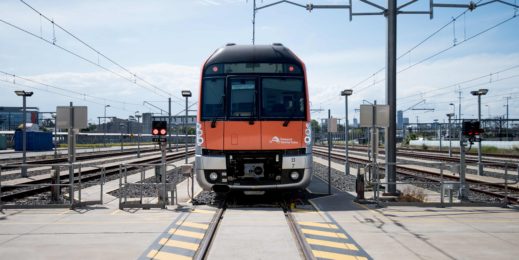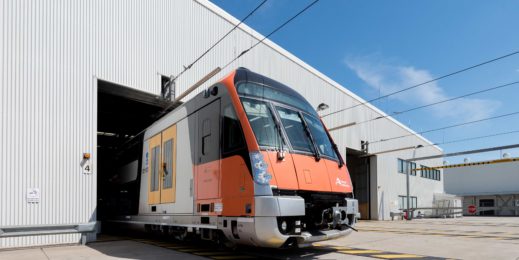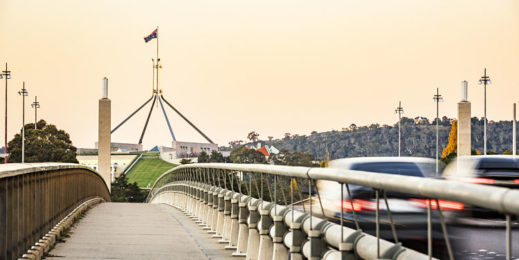
Transport for NSW presses pedal to the metal on digital transformation
Transport for NSW’s focus is on helping people in the State move efficiently, effectively wherever and whenever they need. To do that, the organisation is evolving from a series of single-transport-mode organisations into a true multi-modal agency designed to deliver streamlined end-to-end journeys across NSW while ensuring the system’s financial sustainability.
To do that, it has a team of 30,000 people and oversight of $57.5 billion worth of infrastructure projects over the next four years.
It also has a digitally transformed operational environment designed to support a new and more flexible way of working. Microsoft Office 365 and Teams play pivotal roles, while Surface Hub devices have been rolled out across the Agency to inject organisational agility and rapid response capability.

The Hubs are driving successful hybrid collaboration across the organisation. Located in open office areas, as well as in meeting rooms, they make use of features such as whiteboarding to allow seamless collaboration, whether people are using the system in person, or participating in the session remotely.
As organisations embrace a more hybrid way of working post pandemic – allowing people the flexibility to work from home or on-site – digital technologies such as Teams and Surface Hubs are proving critical in order to streamline and simplify communications and collaboration.
TfNSW is in the process of establishing five major office hubs across the Sydney metropolitan area. It will also operate out of offices right across NSW and has commissioned two brand new buildings, one at Macquarie Park, which will be home to almost 3,000 staff, and a CBD hub in the heart of Sydney – both of which are designed to support activity-based working.
Richard Host is the Group Chief Information Officer at Transport for NSW (TfNSW) and overseeing its digital transformation.
Rapid Response
A first critical step in TfNSW’s transformation was transitioning everyone in the organisation onto Office 365. With that work largely completed in 2019, Host was able to fast track the adoption of Microsoft Teams to support remote working when the COVID-19 pandemic struck.
“We managed to get 15,000 people to work from home and do six months of training in two weeks,” he says.
The speed with which that was achieved turned TfNSW’s IT team into “local heroes,” says Host. “Staff could not believe that we could actually pull this off. They couldn’t believe it. They were amazed.
I think the main reason that we were successful was that it was Microsoft delivering it at the end of the day. The live events streaming to all staff were one of the most important forms of communication during the pandemic.
The transition to Live Events on Teams also ensured that TfNSW’s regional staff were included and had access – sometimes for the first time – to the same information and communications opportunities as their metro-based peers. “The staff from the regional area felt that for the first time they’re on a level playing field, that they were equal to their metropolitan colleagues,” says Host.
TfNSW also rapidly deployed Telstra Calling for Office 365. This overcame challenges with congestion on mobile phone networks as people right across Australia started to work from home. The first group to use Telstra Calling for Office 365 was TfNSW’s COVID-19 task force which needed totally reliable communications to connect to emergency services.
Providing Telstra Calling for Office 365 ultimately ensured all of the TfNSW staff who were now working from home had the tools and technologies they needed to stay productive. He believes that the desk phone’s days are numbered and anticipates significant savings as the older PABX communications network is progressively dismantled.
“I don’t think people really twigged that we were paying a support cost through our outsource provider on a per handset basis per month on top of the PABX costs on top of the network costs.
“There were a lot of costs associated with those desk phones. So we will save money once we can turn everything off, but the utility of being able to make a call from anywhere and receive a call on a landline number so people don’t have to expose their mobile phone number is gold.”
Savings and Security
Teams has delivered additional savings – instead of making 278,000 internal phone calls every month, TfNSW staff can now use Teams to communicate and collaborate with one another, with the additional benefit of video to enrich the connection. Frontline staff also have access to Teams from their mobile phones, injecting additional flexibility.
In order to benefit from this, with no compromise on security, TfNSW introduced two-factor authentication, which according to Host, has dramatically improved its security posture and allowed it to feel confident about the new way of working.
According to Host; “We wouldn’t have got through the pandemic like we have without Microsoft Teams. It’s been an absolute lifesaver. In January 2020, we made 538 Teams calls in the whole month; in November 2020, we made more than 270,000 Teams calls.
In January 2020, we had 998 Teams meetings, and in November 2020 we had 191,000 Teams meetings. In January 2020 there were 82,000 chats and in November 2020, there were 4.5 million chats
It’s been a dramatic change to the way people at TfNSW work – and heralds an enduring workplace change, says Host.
“One of the silver linings of COVID is that it’s opened up a whole new world of flexible working. A year ago, no one could have imagined that actually happening at Transport and so quickly.”

Workplace transformation
Even before the pandemic hit, TfNSW was planning to revamp its meeting facilities, leveraging a range of Microsoft technologies, including Microsoft Bookings to streamline meetings. Now, as people return to offices, this allows much more effective use of meeting rooms and shared spaces.
“This year we’ve installed 166 rooms,” says Host, adding; “We’ve got another 328 rooms in flight. So that’s 494 rooms we will have done this financial year. Additionally we have another 180 collaboration spaces.”
The digital transformation has delivered TfNSW with a richly featured hybrid workplace. Staff are able to use Teams at home, in the office, or when they are on the move, with Surface Hubs and whiteboarding capability also deployed in meeting rooms and communal office spaces to facilitate stand-ups, collaboration sessions and group huddles. This brings together teams of people who might be working in regional locations, from home, or in one of the metro offices.
Because everyone has access to the same technology, everyone has an equivalent, richly featured experience, promoting optimal outcomes.
Facilitating communications and collaboration across the whole of TfNSW, regardless of the location of a participating employee, is critical to the organisation’s goal of creating a true end-to-end integrated transport system linking regional, remote and metro NSW.
TfNSW used Surface Hubs to fast track its transformation – standing up the devices to promote collaboration where and when they were needed – including to help teams formed to tackle bushfire or COVID related tasks.
“As long as you’ve got WiFi, you’ve got a room fitted out. The main benefits of the Surface Hub, is that they’re mobile, they’re easy to deploy, they are Teams compatible, they’re intuitive to use, and they’re nice-looking kit,” says Host.
“We are a high tech organisation and it fits in really nicely,” he says, adding that TfNSW has installed or is in the process of installing 118 Surface Hubs.
“A great use case was to get them into the smaller offices in the regional areas really quick. We’ve also used them for the bushfires when we had them, and for the COVID task force where they needed the touch screen extremely quickly.”
Accelerated results
Host credits the Microsoft ecosystem with having helped TfNSW accelerate its digital transformation. “We’d invested in the ecosystem so we had it all ready to go. Microsoft helped us when we needed to suddenly send 15,000 people home.
Microsoft Teams has allowed us to step out of the legacy systems into a clean and pure cloud system that works out of the box over the internet on any device. And our staff have embraced it and they’re advocates for it, and so apart from making it through the pandemic, post pandemic we are forever changed in the way that we collaborate.
“It’s broken down the geographic barriers in a way that we hadn’t expected. It’s allowed our leaders to communicate in new and innovative ways that I don’t think any of them imagined it and it’s certainly ushered in flexible working, which will benefit everybody.”









